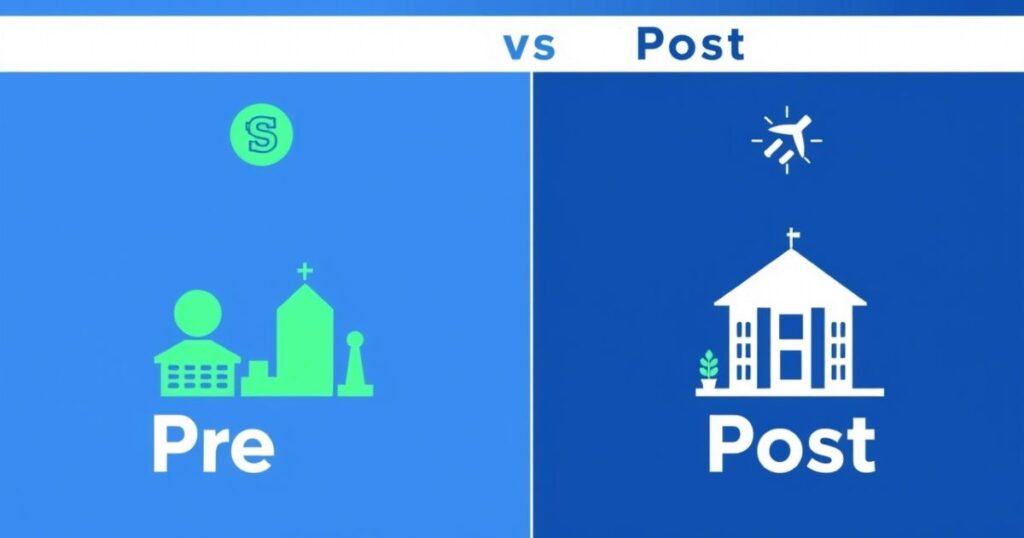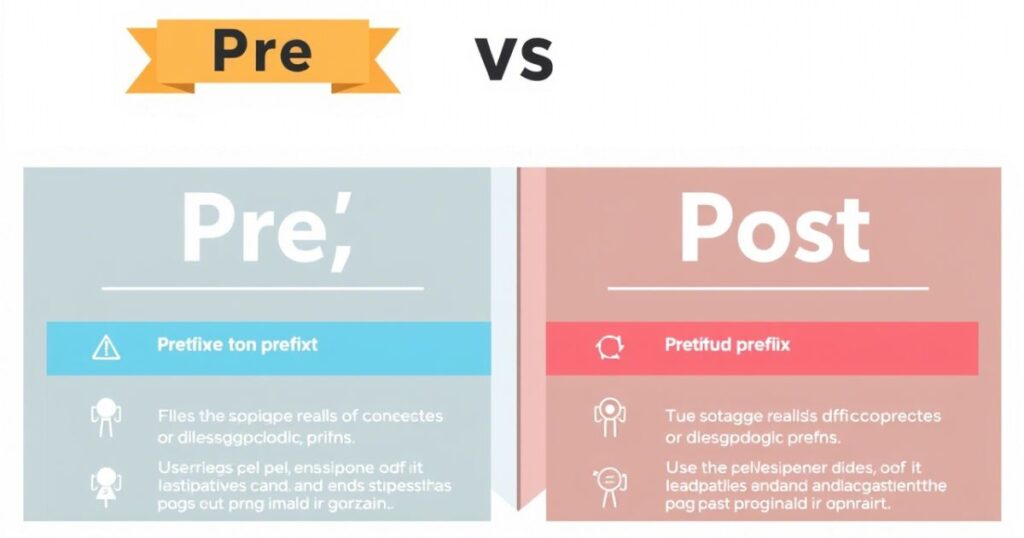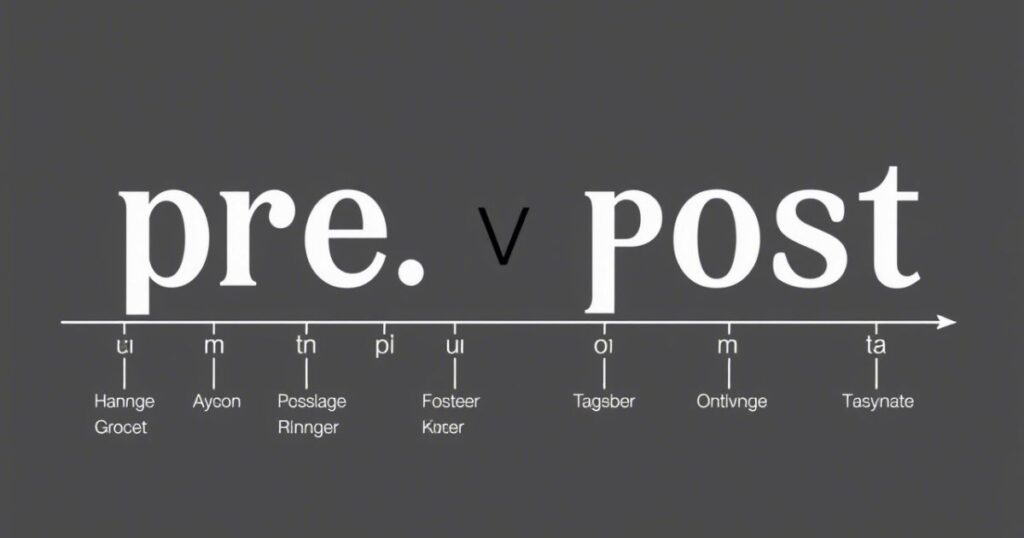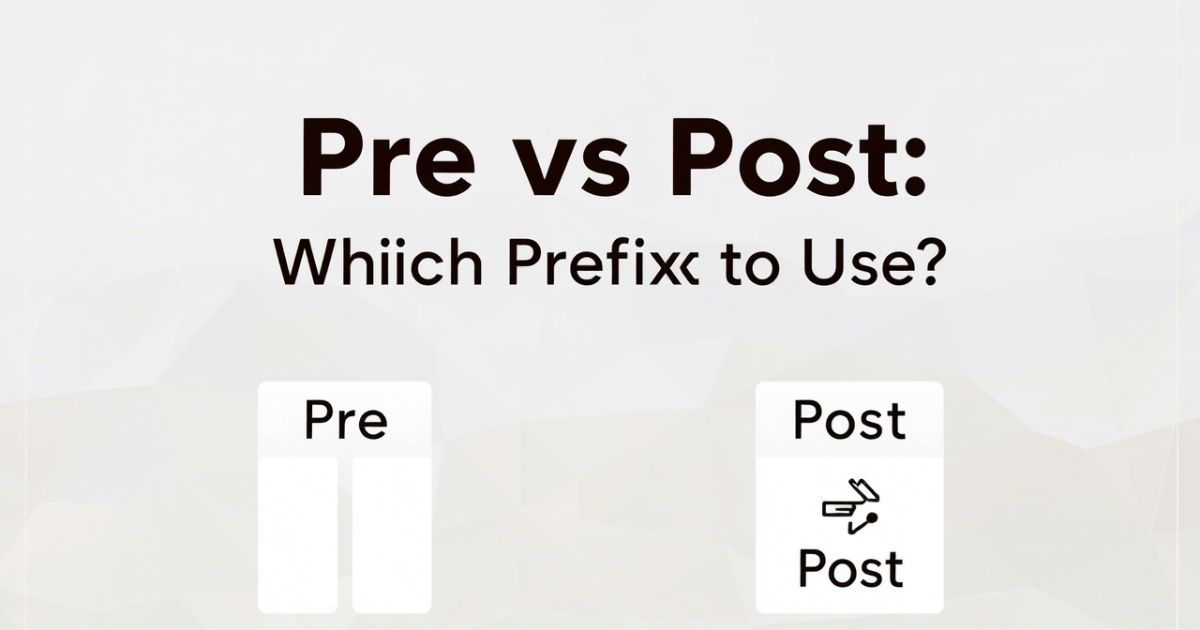Pre vs Post is a common phrase. But many people ask, what does pre and post mean? These tiny words change meaning in big ways. They show time. One means before, the other after. It’s important to know the difference.
This guide explains pre vs post in simple terms. We’ll look at pre and post meaning. You’ll also understand post vs pre meaning. Some examples will help. Think of pre-heat and post-cleanup. Easy, right? Whether it’s post vs pre in grammar or real life, this guide helps. After reading, you’ll never mix them up again. Pre vs post will make more sense. Just remember: “pre” = earlier, and “post” = later. That’s it! Keep reading to learn more about pre vs post and how they affect words, actions, and time.
Pre and Post: Tiny Words, Big Impact!

Pre and Post may be small words, but they carry a big impact. They shape our understanding of time, helping us organize actions and events before and after they happen.
Understanding Pre and Post
- Pre means before something happens; post means after it happens.
- Both are prefixes added to root or base words to change meaning.
- You’ll see them in terms like pre-heat, pre-order, or post-game.
- They help show timeline, sequence, and the order of events.
- These prefixes come from Latin roots: pre = before, post = after.
While Handy, Not Quite Antonyms
- Pre vs Post seem opposite, but they aren’t perfect antonyms.
- Some actions need both parts, like pre-operative and post-operative care.
- They describe stages: earlier stage and later stages, not exact opposites.
- You may find both in the same process, like pre-postoperative care.
- Think of them as bookmarks: prologue and epilogue in a story.
Let’s Get Practical!
- Use pre-enroll to sign up early for classes or events.
- After an event, do a post-mortem analysis to reflect.
- Pre-baking is key in cooking; post-cleanup follows the meal.
- Stretch for muscle recovery after a workout your post-workout step.
- Planning? Know the pre-requisite before taking a future event.
Pre vs Post: The Differences Made Clear

Pre vs Post clearly show the difference between before and after an event. Pre signals preparation, while post reflects what happens afterward, defining the timeline.
Timeline:
- Pre comes first on the timeline, before the main event happens.
- Post happens after, in the aftermath or later stages.
- Events like pre-interview come before a job meeting.
- Post-mortem or post-analysis come after the action ends.
- This sequence helps show cause, effect, and reflection clearly.
Function:
- Pre shows preparation, setting the stage for what’s coming.
- Post often means reflection, response, or follow-up.
- Both help form useful compound words in daily speech.
- In grammar, they act as prefixes to explain timing.
- They’re helpful in planning, medicine, school, and everyday life.
Related Guide:
Requester or Requestor: Which Spelling to Use?
Remember:
- Pre = earlier, post = later — that’s the easy rule.
- Think pre-med before med school, post-operative after surgery.
- Use them to understand time and order in life.
- Post vs Pre meaning helps clear up confusion fast.
- Keep these memory aids and examples to learn better.
| Feature | Pre | Post |
| Meaning | Before an event or action | After an event or action |
| Common Use | Pre-heat, pre-order, pre-enroll | Post-game, post-surgery, post-cleanup |
| Function | Shows preparation or setup | Shows aftermath or follow-up |
| Grammar Role | Acts as a prefix | Acts as a prefix |
| Domain Examples | Pre-med, pre-operative, pre-baking | Post-mortem, post-workout, post-operative care |
Origins of ‘Pre’ and ‘Post’

The prefixes pre and post come from Latin, with pre meaning before and post meaning after. These roots have shaped many words used to describe timing and sequence.
Pre:
Pre refers to anything that happens before an event or action. It signals preparation or a step taken in advance. For example, pre-heat means to heat an oven before baking. Similarly, pre-enroll means signing up for something before the official start date.
In grammar, pre is a prefix attached to words, showing that something happens earlier in time. It’s often used in contexts like pre-med or pre-operative, where actions must occur before a major event like medical treatment or surgery. It sets up the timeline for what comes next.
Post:
Post means anything that happens after an event or action has taken place. It marks the aftermath or results. For instance, post-surgery refers to the care required after a medical procedure. Likewise, post-game analysis happens once a match is finished.
In language, post works as a prefix added to words to show a sequence in time. It’s used in phrases like post-party cleanup or post-mortem analysis, highlighting actions that take place after an event. Post provides context for understanding what comes once something is complete.
Examples in Context
Pre and Post are often used in real-life situations, like pre-ordering food before a party or doing post-workout stretches for muscle recovery. These examples show how timing affects actions and planning.
Pre:
- Means before something happens
- Used in words like pre-heat, pre-enroll, pre-operative
- Shows preparation or the earlier stage of an event
- Comes from Latin meaning before
- Helps set the stage for what’s coming
Post:
- Means after something happens
- Used in words like post-party, post-surgery, post-analysis
- Refers to aftermath, results, or later stages
- Comes from Latin meaning after
- Often used in reflection or follow-up situations
FAQ’s
What is the meaning of Pre vs Post?
Pre vs Post shows timing. Pre means before something happens, and post means after it has happened.
How do you use Pre vs Post in daily life?
We use Pre and Post in words like pre-heat or post-meeting. These help explain actions before or after events.
Why is Pre vs Post important in grammar?
Pre and Post helps in word formation. It tells us when things happen and gives context to actions or events.
What are examples of Pre vs Post words?
Common Pre and Post words are pre-order, pre-baking, post-game, post-analysis. Each word clearly shows timing and meaning.
What does Pre vs Post mean in healthcare?
In healthcare, Pre and Post matters a lot. Think pre-operative prep and post surgical carem they show steps before and after surgery.
Conclusion
Understanding Pre vs Post helps us talk about time clearly. These little words show if something happens before or after an event. For example, pre enroll means to sign up early. Post surgery means after the operation. These words appear in school, health, sports, and everyday life. Knowing pre and post meaning helps you follow instructions and understand schedules. Think about a pre interview call or a post meeting note they tell you when things happen.
Many words use these forms. You’ll see pre baking, post party, or even post mortem. Each one points to a place in a timeline. You set the stage with preparation, then reflect in the aftermath. In grammar, they help form compound words. The base word stays, but the prefix tells us more. So, the next time someone asks what does pre and post mean, you’ll know. Post vs pre is simple when you understand time and sequence.

Ember Rose is a dedicated administrator with 4 years of experience in efficient operations management and team leadership. Skilled in streamlining workflows and enhancing productivity.

